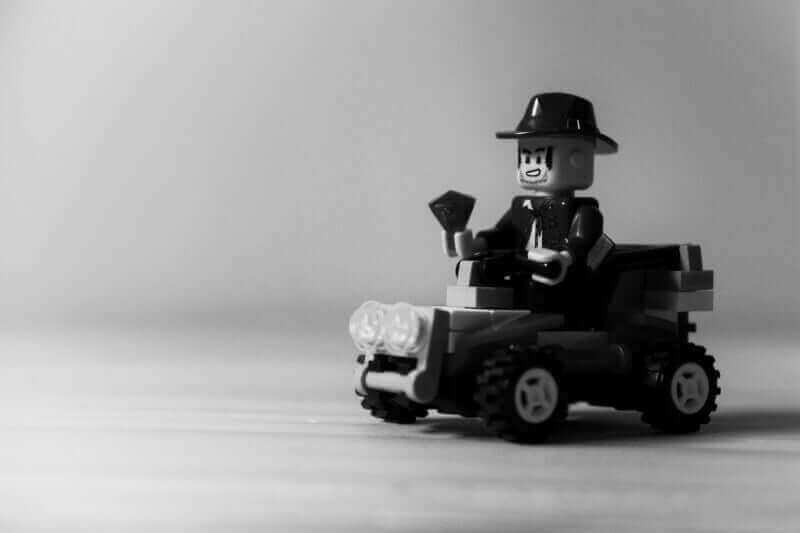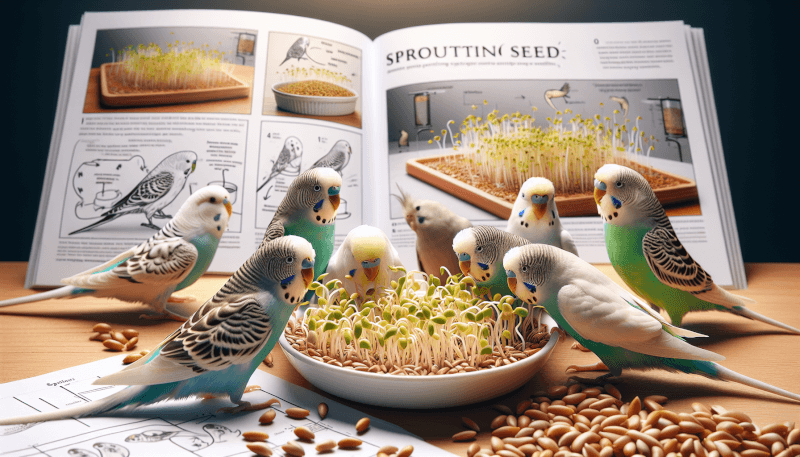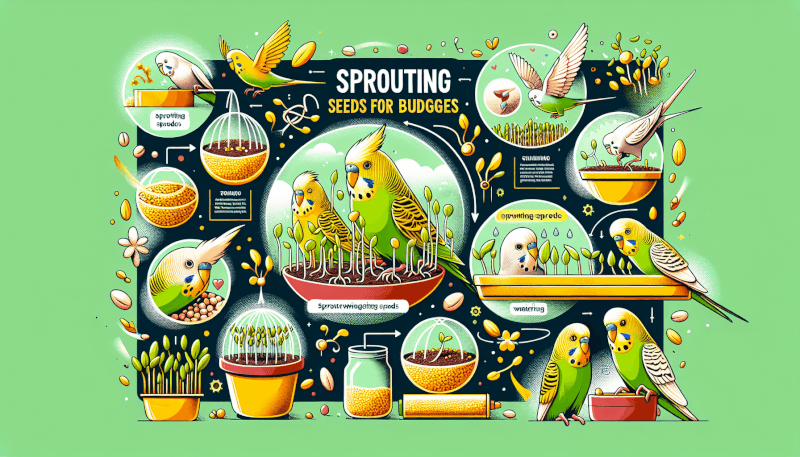👋 Click the mic button to talk to Alfred, the Todd's Seeds Gardening/Sprouting Expert – Feel free to ask him anything!
Ask Virtual Todd Anything - Click the Mic
Are you a proud owner of a budgie? If so, you’ll want to know about the incredible benefits of sprouting seeds for your feathered friend. Sprouting seeds not only provide a high nutritional value, but they also offer a delightful variety to your budgie’s diet. In this article, we’ll explore why sprouting seeds are a fantastic addition to your bird’s meal plan, and how you can easily incorporate them into their daily routine. Get ready to embark on an exciting journey that will leave your budgie chirping with joy!

Choosing the Right Seeds
Understanding Budgies’ Dietary Needs
When it comes to choosing the right seeds for your budgies, it’s important to have a good understanding of their unique dietary needs. Budgies are small birds that require a balanced diet that includes a variety of seeds, fruits, vegetables, and other nutritional supplements. Seeds play a crucial role in their diet as they provide essential nutrients such as protein, fats, carbohydrates, vitamins, and minerals.
Selecting Quality Seeds
Selecting high-quality seeds is vital to ensure that your budgies receive the necessary nutrients. Look for seeds that are fresh, clean, and free from any signs of mold, insects, or other contaminants. It’s also essential to choose seeds that are specifically formulated for budgies, as they have different dietary requirements compared to other bird species. You can find a wide range of seed mixes specifically designed for budgies at your local pet store or online.
Variety of Seeds to Consider
Budgies enjoy a variety of seeds, so it’s essential to provide them with different types to keep their diet interesting and balanced. Some commonly enjoyed seeds by budgies include millet, canary grass seed, flaxseed, hemp seed, and sunflower seeds. It’s crucial to offer a mix of these seeds to provide a diverse range of nutrients. Experimenting with different combinations can help you find out which seeds your budgies prefer.
Soaking and Rinsing Seeds
Importance of Soaking Seeds
Soaking seeds before feeding them to your budgies has several benefits. Soaking helps to soften the seeds, making them easier for the birds to digest. It also helps to remove any natural inhibitors present in the seeds, allowing the nutrients to become more accessible to your budgies. Additionally, soaking seeds can help increase the moisture content, ensuring your budgies stay hydrated.
Proper Soaking Technique
To soak the seeds effectively, start by placing them in a clean container and covering them with room temperature water. Let the seeds soak for 8 to 12 hours, or overnight. After soaking, drain the water and rinse the seeds thoroughly to remove any residue. It’s essential to use clean, filtered water for soaking to avoid any potential contamination.
Rinsing to Remove Excess Starch
Rinsing the soaked seeds is an important step to remove excess starch that may have accumulated during the soaking process. This excess starch can lead to the growth of harmful bacteria if left untreated. To rinse the seeds, simply place them in a sieve or strainer and run clean water over them until the water runs clear. This will ensure that your budgies are getting clean and healthy sprouts.
Precautions for Soaking and Rinsing
While soaking and rinsing seeds is a beneficial practice, it’s important to take some precautions. Make sure to use clean containers, utensils, and filtered water to prevent any potential contamination. Additionally, avoid over-soaking the seeds, as this can lead to spoilage. Proper hygiene and cleanliness are crucial throughout the soaking and rinsing process to ensure the health and well-being of your budgies.
Creating a Sprouting Environment
Choosing a Sprouting Container
To create an ideal sprouting environment for your budgies, it’s important to choose the right sprouting container. Look for a container that is large enough to accommodate the amount of seeds you wish to sprout. It should also have good drainage to prevent the seeds from becoming waterlogged. A container with a sieve or mesh insert is ideal as it allows for proper airflow and drainage.
Preparing the Sprouting Container
Before sprouting the seeds, it’s essential to prepare the sprouting container to create a clean and suitable environment for sprouting. Start by thoroughly cleaning the container with soap and water, ensuring there are no traces of dirt or residue. Rinse the container well and let it air dry. Once dry, place a layer of clean paper towels or cheesecloth at the bottom of the container to catch any excess water.
Providing Adequate Light and Warmth
Light and warmth are essential for successful sprouting. Place the sprouting container in a well-lit area, preferably near a window or under a grow light. Natural sunlight or artificial light should be provided for at least 8 to 12 hours a day. Additionally, maintaining a temperature between 68°F and 78°F (20°C to 25°C) will help to promote the sprouting process. Avoid placing the container in direct sunlight or in an area where there are extreme temperature fluctuations.
Maintaining Proper Humidity
Humidity is another important factor for successful sprouting. To maintain proper humidity levels, lightly mist the seeds once or twice a day with clean, filtered water. Be careful not to oversaturate the seeds as excessive moisture can lead to mold growth. It’s important to monitor the humidity levels and adjust accordingly to ensure optimal sprouting conditions for your budgies.
The Sprouting Process
Preparing Seeds for Sprouting
Before starting the sprouting process, ensure that the seeds you are using are suitable for sprouting. Not all seeds are suitable for sprouting, and some may even be toxic to budgies. Refer to a reliable source or consult with a veterinarian to determine which seeds are safe for sprouting. Once you have selected the appropriate seeds, follow the soaking and rinsing process mentioned earlier.
Sprouting Techniques
There are several techniques you can use to sprout seeds for your budgies. One common method is to spread the soaked and rinsed seeds evenly on top of the prepared sprouting container. Gently press the seeds down to ensure good contact with the paper towels or cheesecloth. Another method is to place the soaked seeds in a sprouting jar with a mesh lid, allowing for proper airflow. The choice of sprouting technique depends on personal preference and the type of seeds being sprouted.
Duration of Sprouting
The duration of sprouting can vary depending on the type of seeds and the desired sprout length. On average, most seeds take around 2 to 7 days to sprout. It’s important to monitor the sprouts regularly and harvest them once they reach the desired length. If left to sprout for too long, the sprouts may become too long and less palatable for your budgies.
Checking for Mold or Spoilage
During the sprouting process, it’s important to keep a close eye on the sprouts for any signs of mold or spoilage. Mold growth can occur if the seeds are not properly soaked, rinsed, or if they are exposed to excessive moisture. If you notice any signs of mold, such as a musty smell or fuzzy patches, it’s crucial to discard the sprouts immediately and start the sprouting process again using fresh seeds.

Feeding Sprouted Seeds to Budgies
Gradually Introducing Sprouts into the Diet
When introducing sprouted seeds to your budgies’ diet, it’s important to do so gradually. Start by offering a small amount of sprouts mixed with their regular seed mix. Over time, gradually increase the proportion of sprouts while reducing the amount of regular seeds. This allows your budgies to adjust to the new food and ensures a smooth transition to a healthier, sprout-based diet.
Serving the Sprouts to Budgies
To serve the sprouts to your budgies, simply place a small portion in their feeding dish. Sprouts can be served moist or dry, depending on your budgies’ preference. Some budgies may enjoy having their sprouts misted with water or mixed with a little bit of fruit puree for added flavor. It’s essential to provide fresh sprouts daily and remove any uneaten portions to prevent spoilage.
Observe Budgie’s Preference
Each budgie may have its own preference when it comes to sprouts. Some budgies may readily accept and enjoy sprouts, while others may take some time to adjust to the new food. Observe your budgies’ eating habits and preferences and adjust the sprouting process accordingly. You may need to experiment with different types of seeds or sprouting techniques to find what works best for your budgies.
Storage and Shelf Life of Sprouted Seeds
Sprouted seeds should be stored in the refrigerator to maintain freshness and prevent spoilage. Place the sprouts in an airtight container or zip-lock bag and store them in the vegetable crisper section of the refrigerator. Sprouts can typically be stored for up to 3 to 5 days, depending on their freshness. However, it’s always best to offer fresh sprouts to ensure maximum nutritional value for your budgies.
Additional Nutrition Sources
Introducing Fruits and Vegetables
While sprouted seeds provide essential nutrients, it’s important to supplement your budgies’ diet with a variety of fruits and vegetables. These fresh produce items offer additional vitamins, minerals, and fiber that are beneficial for your budgies’ overall health. Some safe fruits and vegetables for budgies include apples, oranges, carrots, spinach, and broccoli. It’s essential to wash fruits and vegetables thoroughly and remove any seeds, pits, or skins before serving them to your budgies.
Supplementing with Bird Food Pellets
Bird food pellets can also be a nutritious addition to your budgies’ diet. They are formulated to provide a balanced mix of nutrients and are fortified with vitamins and minerals. When selecting bird food pellets, opt for those specifically designed for budgies. Pellets can be offered alongside sprouted seeds and fresh produce, ensuring your budgies receive a diverse range of nutritional sources.
Other Nutritional Supplements
In certain cases, your budgies may have specific dietary requirements that cannot be met through seeds, sprouts, fruits, or vegetables alone. In such instances, it may be necessary to provide additional nutritional supplements. However, it’s crucial to consult with a veterinarian before introducing any supplements, as they can have varying effects on budgies depending on their individual needs.

Monitoring Budgie’s Health
Regularly Monitoring Budgie’s Weight
Regularly monitoring your budgies’ weight is an essential part of ensuring their overall health. Weight loss or gain can indicate underlying health issues or nutritional imbalances. Use a small gram scale designed for birds to accurately measure your budgies’ weight. Ideally, the weight should remain stable within a healthy range. If you notice any significant fluctuations, it’s important to consult with a veterinarian.
Observing Changes in Behavior or Droppings
Alongside monitoring your budgies’ weight, it’s important to observe any changes in their behavior or droppings. Changes in appetite, energy levels, vocalization, or droppings can indicate potential health problems. Budgies may hide signs of illness, so it’s crucial to pay close attention to any abnormalities. If you notice any concerning changes, seek advice from a veterinarian knowledgeable in avian care.
Consulting a Veterinarian
If you have any concerns about your budgies’ health or nutrition, it’s always best to consult with a veterinarian specializing in avian care. They can provide expert advice, perform necessary examinations, and offer appropriate treatments or recommendations tailored to your budgies’ needs. Regular wellness check-ups are also beneficial to ensure your budgies remain in good health.
Potential Risks and Precautions
Avoidance of Contaminated Seeds
To ensure the health and safety of your budgies, it’s crucial to avoid contaminated seeds. Contaminated seeds can carry harmful bacteria or fungi that can cause serious health issues. Always purchase seeds from reputable sources and check for any signs of mold, insects, or other contaminants before offering them to your budgies. Proper storage in a cool, dry place can also help prevent contamination.
Preventing Bacterial Growth
Bacterial growth can occur if seeds or sprouts are not properly soaked, rinsed, or stored. It’s important to follow the soaking and rinsing techniques mentioned earlier to minimize bacterial growth. Additionally, ensure that the sprouting container and utensils used are thoroughly cleaned and sanitized before each use. Regularly inspect the sprouts for any signs of spoilage or mold and discard them immediately.
Ensuring Clean Drinking Water
Access to clean, fresh drinking water is essential for budgies’ health and well-being. Make sure to provide your budgies with clean water in a suitable water dispenser or dish. Change the water daily and clean the dispenser regularly to prevent the growth of bacteria or algae. Regularly check for any debris or contaminants that may have entered the water.
Avoiding Overfeeding
While sprouts are a healthy addition to your budgies’ diet, it’s important to avoid overfeeding. Budgies have small stomachs and can only consume a certain amount of food each day. Offering an excessive amount of sprouts can lead to overeating, which can cause digestive issues and weight gain. Feed your budgies the appropriate portion sizes based on their daily nutritional requirements.

Sprouting Seeds FAQs
Can all types of seeds be sprouted?
Not all types of seeds are suitable for sprouting, and some may even be toxic to budgies. It’s important to research or consult with a veterinarian to determine which seeds are safe for sprouting. Stick to seeds specifically formulated for budgies to ensure their nutritional needs are met.
How long does it take to sprout seeds?
The duration of sprouting can vary depending on the type of seeds and the desired sprout length. On average, most seeds take around 2 to 7 days to sprout. It’s important to monitor the sprouts regularly and harvest them once they reach the desired length.
Can I sprout seeds in various climates?
Yes, you can sprout seeds in various climates. However, it’s important to maintain optimal conditions for sprouting, including proper light, warmth, and humidity. Adjustments may be necessary depending on the climate to ensure successful sprouting.
Can budgies eat sprouted seeds exclusively?
While sprouted seeds are a nutritious addition to budgies’ diet, they should not be the sole source of nutrition. Budgies require a balanced diet that includes a variety of seeds, fruits, vegetables, and other supplements. Offering a diverse range of foods ensures that they receive all the necessary nutrients for optimal health.
Conclusion
Sprouting seeds for your budgies is a great way to enhance their diet and promote their overall health. By understanding their dietary needs and providing a variety of quality seeds, you can ensure that your budgies receive the essential nutrients they require. Soaking and rinsing seeds, creating a suitable sprouting environment, and monitoring the sprouting process are crucial steps in successfully sprouting seeds. Introducing sprouts gradually, in addition to other nutritional sources such as fruits, vegetables, and bird food pellets, further enhances your budgies’ diet. It’s important to monitor your budgies’ health, take precautions to prevent potential risks, and seek veterinary advice when needed. Sprouting seeds for budgies not only adds diversity to their diet but also provides enrichment and contributes to their overall well-being. With proper care and attention, sprouting seeds can be a rewarding and beneficial experience for both you and your budgies.
